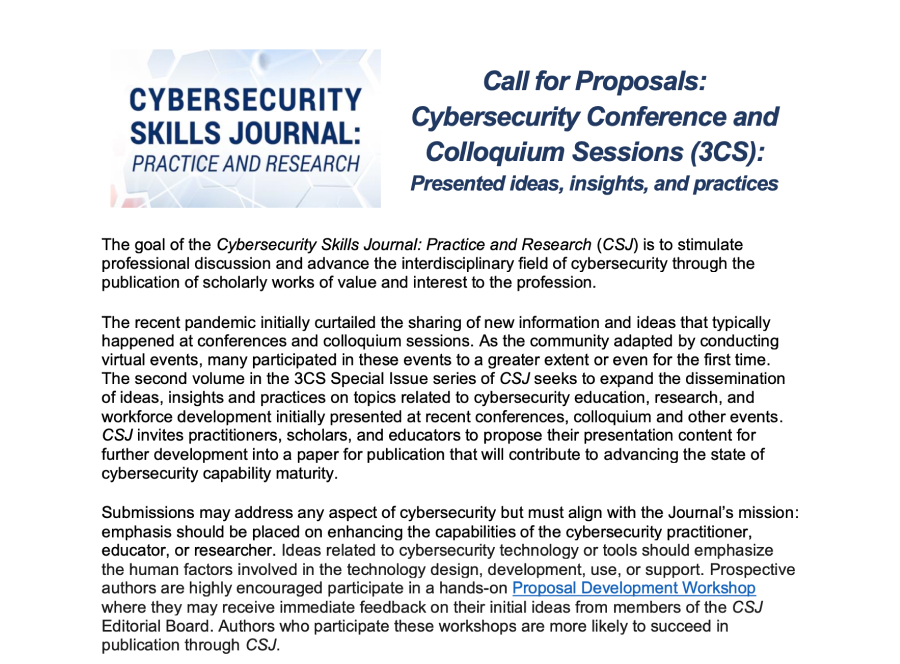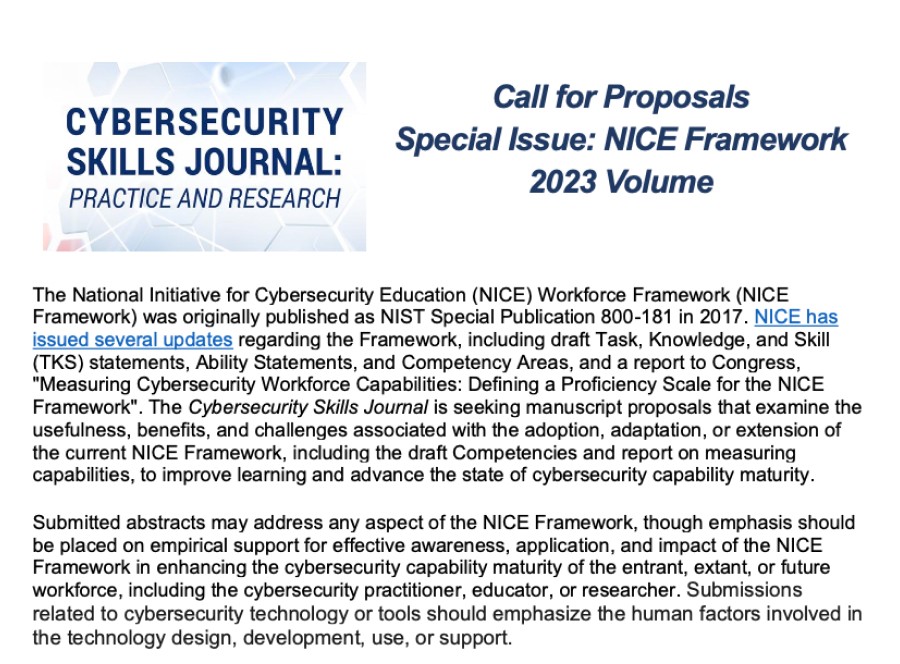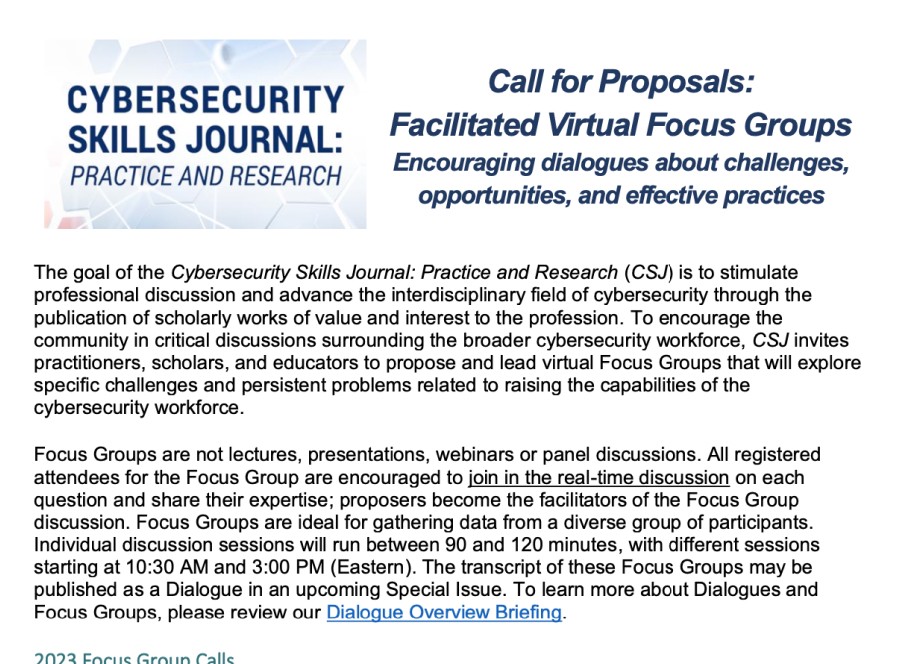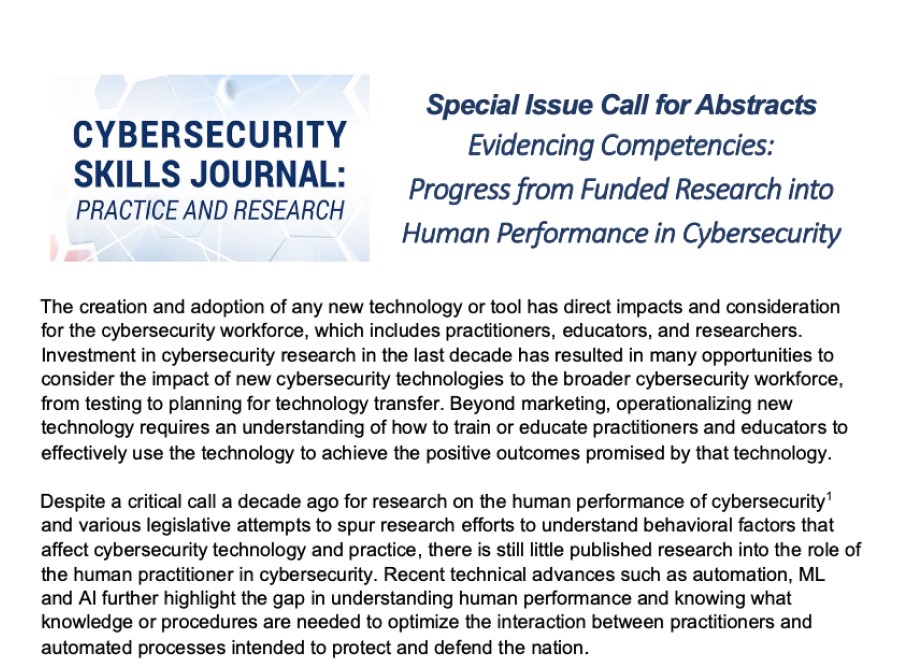Call for Proposals
The Cybersecurity Skills Journal: Practice and Research (CSJ) is a double-blind peer-reviewed journal published by the CyberWatch Center Digital Press. The goal of CSJ is to stimulate professional discussion and advance the interdisciplinary field of cybersecurity through the publication of scholarly works of value and interest to the profession. CSJ seeks to integrate and expand the methods, processes, and evidence of effective practices which underlie skilled performance. CSJ focuses on valued, measured results; considers the larger system context of people’s performance; and provides valid and reliable measures of effectiveness.
CSJ uses a two-step submission process to encourage submissions aligned with our mission. Prospective authors are highly encouraged to review the Overview Presentation and attend a Proposal Development Workshop to understand the different paper types and submission requirements. Our Manuscript Content Guidelines provide specifications for practice, instructional design, or research section manuscripts, and the Author Guidelines details the structured abstract format used by CSJ and the processes for developing accepted manuscripts. Abstracts on technical solutions that lack a substantive contribution for improving or teaching skillful performance of cybersecurity job functions and roles do not align with our mission and will not be considered.
Submissions are accepted for any open Call for Proposals on a rolling basis. Please submit your ideas for Proposals at https://easychair.org/conferences/?conf=csjoc2023.
Cybersecurity Conference and Colloquium Sessions (3CS), VOL 2.
The recent pandemic initially curtailed the sharing of new information and ideas that typically happened at conferences and colloquium sessions. As the community adapted by conducting virtual events, many participated in these events to a greater extent or even for the first time. The second volume in the 3CS Special Issue series of CSJ seeks to expand the dissemination of ideas, insights and practices on topics related to cybersecurity education, research, and workforce development initially presented at recent conferences, colloquium and other events. CSJ invites practitioners, scholars, and educators to propose their presentation content for further development into a paper for publication that will contribute to advancing the state of cybersecurity capability maturity.
Timeline for the 3CS VOL. 2
Submissions are accepted on a rolling basis.
Submissions may address any aspect of cybersecurity but must align with the Journal’s mission: emphasis should be placed on enhancing the capabilities of the cybersecurity practitioner, educator, or researcher. Ideas related to cybersecurity technology or tools should emphasize the human factors involved in the technology design, development, use, or support. Prospective authors are highly encouraged participate in a hands-on Proposal Development Workshop where they may receive immediate feedback on their initial ideas from members of the CSJ Editorial Board. Authors who participate these workshops are more likely to succeed in publication through CSJ.
If your organization runs a conference or colloquium and is interested in publishing proceedings with this Special Issue, please contact the Editors at csjeditors@nationalcyberwatch.org.
Special Issue: NICE Framework, VOL. 2
The National Initiative for Cybersecurity Education (NICE) Workforce Framework (NICE Framework) was originally published as NIST Special Publication 800-181 in 2017. NICE has issued several updates regarding the Framework, including draft Task, Knowledge, and Skill (TKS) statements, Ability Statements, and Competency Areas, and a report to Congress, “Measuring Cybersecurity Workforce Capabilities: Defining a Proficiency Scale for the NICE Framework.” The Cybersecurity Skills Journal is seeking manuscript proposals that examine the usefulness, benefits, and challenges associated with the adoption, adaptation, or extension of the current NICE Framework, including the draft Competencies and report on measuring capabilities, to improve learning and advance the state of cybersecurity capability maturity.
Timeline for the Special Issue: NICE Framework, VOL. 2
Submissions are accepted on a rolling basis.
Proposals may address any research questions related to any challenges, opportunities, or effective practices related to the NICE Workforce Framework, such as:
a. What are achievable measures of success for the NICE Strategic Plan, or for Implementation Plans from the NICE Working Groups or Communities of Interest?
b. What challenges are YOU or YOUR ORGANIZATION wrestling with regarding implementation of the NICE Framework, e.g., challenges using the NICE Framework Competencies to develop the cybersecurity workforce needed in your specific industry or region.
c. How might the refactored Knowledge and Skill statements inform research to empirically identify shortfalls in our cybersecurity workforce skills and/or training and preparation?
d. Is there empirical evidence that cybersecurity competitions actually improve or provide accurate assessment of specific Knowledge or Skill statements in the NICE Framework? How could this evidence be collected or crowd-sourced?
Facilitated Virtual Focus Group, VOL. 2
The goal of the Cybersecurity Skills Journal: Practice and Research (CSJ) is to stimulate professional discussion and advance the interdisciplinary field of cybersecurity through the publication of scholarly works of value and interest to the profession. To encourage the community to engage in critical discussions surrounding the broader cybersecurity workforce, CSJ invites practitioners, scholars, and educators to propose and lead live virtual Focus Groups that will explore specific challenges and persistent problems related to raising the capabilities of the cybersecurity workforce. Proposals may address any aspect of research into cybersecurity but must align with the Journal’s mission: emphasis should be placed on enhancing the capabilities of the cybersecurity practitioner, educator, or researcher.
Join CSJ on May 25, 2023 for a webinar, “Developing Dialogues on the Adoption, Adaptation, or Extension of the NICE Framework” to learn how to design and submit your Focus Group session idea. The webinar will cover topics like identifying investigative questions, creating a successful Focus Group inquiry, and preparing a publishable transcript that can inform the nation and broaden the impact of the NICE Framework. Register today at https://bit.ly/CSJ-QA23.
Timeline for the Facilitated Virtual Focus Group, VOL. 2
Submissions are accepted on a rolling basis.
2023 Focus Group Calls
Focus Groups may address any aspect of research into cybersecurity but must align both with a currently open Calls for Proposals for a Special Issue and the Journal’s mission: emphasis should be placed on enhancing the capabilities of the cybersecurity practitioner, educator, or researcher. Submissions related to cybersecurity technology or tools should emphasize the human factors involved in the technology design, development, use, or support.
Those interested in proposing a Focus Group are encouraged to first attend a Proposal Development Workshop to learn more about the core elements of proposing to CSJ and optimize their chances for a successful proposal. Proposals must clearly identify the session topic, e.g., the specific problem and research questions to be explored. Focus Group proposals must also include at least three named and invited participants that are subject matter experts
or stakeholders (e.g., practitioners, hiring managers, CISOs, learners, educators, government, academia, industry, K12, higher ed, etc.) impacted by the proposed topic of the Focus Group. All ideas submitted will be reviewed by the CSJ Editorial Board.
Accepted proposers may choose to pursue publishing their Focus Group discussion as a research manuscript in the form of a CSJ Dialogue. CSJ records all sessions and provides each session facilitator both an audio recording and an automatic transcription of their group discussion. Facilitators review and edit the transcript, and provide an introduction and summary remarks before submitting the Dialogue for publication in a Special Issue from CSJ.
Submission link for 2023 Focus Groups: https://easychair.org/conferences/?conf=csjoc2023
Special Issue: Evidencing Competencies: Progress from Funded Research into Human Performance in Cybersecurity, VOL. 1
The creation and adoption of any new technology or tool has direct impacts and consideration for the cybersecurity workforce, which includes practitioners, educators, and researchers. Investment in cybersecurity research in the last decade has resulted in many opportunities to consider the impact of new cybersecurity technologies to the broader cybersecurity workforce, from testing to planning for technology transfer. Beyond marketing, operationalizing new technology requires an understanding of how to train or educate practitioners and educators to effectively use the technology to achieve the positive outcomes promised by that technology.
Special Issue Timeline
Submissions are accepted on a rolling basis.
Despite a critical call a decade ago for research on the human performance of cybersecurity1 and various legislative attempts to spur research efforts to understand behavioral factors that affect cybersecurity technology and practice, there is still little published research into the role of the human practitioner in cybersecurity. Recent technical advances such as automation, ML and AI further highlight the gap in understanding human performance and knowing what knowledge or procedures are needed to optimize the interaction between practitioners and automated processes intended to protect and defend the nation. The Cybersecurity Skills Journal is seeking ideas and drafts for Articles, Notes and Dialogues that impact cybersecurity practice, improve learning, and advance the state of the cybersecurity workforce’s capability maturity and which arise from recent sponsored research. Abstracts may address any aspect of research into cybersecurity but must align with the Journal’s mission: emphasis should be placed on enhancing the capabilities of the cybersecurity practitioner, educator, or researcher, not on technology.
CSJ seeks submissions in the following areas (non-exclusive list):
- Theoretical/conceptual research with implications for capabilities of the cybersecurity workforce
- Systematic investigations that analyze, evaluate, improve, and measure the human operator’s techniques, tactics and procedures (TTPs) including, but not limited to, the use of technologies
- In-depth, systematic reviews of the research and literature in specific areas of evidence-based practice of cybersecurity by practitioners, educators, and researchers
- Case studies or other qualitative analyses demonstrating the application of innovative tactics, techniques and protocols which highlight critical or often overlooked skill requirements for cybersecurity professionals
- Research on cybersecurity professional practice and performance requirements
- Unique challenges encountered by cybersecurity professionals in applying their knowledge, skill, and abilities
- Instructional designs or materials, assessments, or practice/challenge lab designs that may raise capability maturity in students or professionals
- Design and deployment of instructional systems that raise capability maturity
The Cybersecurity Skills Journal uses a two-step submission process designed to encourage submission of abstracts aligned with the Journal’s mission. Prospective authors are highly encouraged to review the Overview Presentation link below to understand the different paper types and submission requirements.
Detailed specifications for practice, instructional design, or research section manuscripts are available in the Manuscript Content Guidelines. Abstracts on technical solutions that lack a substantive contribution for improving or teaching skillful performance of cybersecurity job functions and roles do not align with the Journal’s mission and will not be considered.




